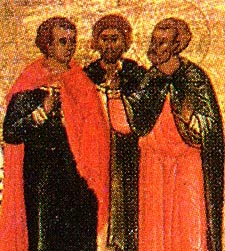|
|||
|---|---|---|---|
| This weekly bulletin insert complements the curriculum published by the Department of Christian Education of the Orthodox Church in America. This and many other Christian Education resources are available at http://dce.oca.org. | |||

The Holy Martyr Theodotus was an innkeeper who lived during the third-century reign of the emperor Diocletian, whose persecution of Christians was the bloodiest of all. Theodotus' inn was a secret refuge for Christians fleeing arrest and probable torture and death. It also served as a kind of way station, from which Theodotus guided his secret guests to safe places in the mountains. Then he provided food and the other basic necessities. He also secretly retrieved the bodies of martyred Christians so he could bury them decently. In the roll of martyred saints, Theodotus is associated with seven other martyrs, all young women: Tecusa, Alexandra, Claudia, Favina, Euphrasia, Matrona and Julia. They were tried and executed, and their bodies were thrown into a lake. Saint Tecusa appeared to Theodotus in a vision, directing him to take her body from the water and bury it. Late at night, guided by an angel and with the help of a companion, Theodotus managed to find all seven bodies, and buried them. But the saint's companion turned out to be no friend. Theodotus was betrayed to the authorities, and suffered the horrible tortures reserved for those who would not deny Christ and revere the gods. As he was taken to be beheaded, other Christians standing by prayed, and wept for him. But he said calmly, "Don't weep, dear friends, but glorify Christ. With His help I am finishing my course and overcoming the enemy." Theodotus was martyred in 303. The book "Dimitri's Cross" (Conciliar Press Ministries, Inc., 2008) is about a modern saint, Fr. Dimitri Klepinin. He worked closely with Mother Maria Skobtsova during the Nazi occupation of Paris, secretly saving many Jews by creating baptismal certificates for them, and sheltering endangered people in a house on the Rue Lourmel. He served as a priest in the house chapel. Someone betrayed them, and he and Mother Maria were arrested in 1943. Fr. Dimitri's daughter, Helene Arjakovsky-Klepinine, has written the account of his life, and has collected letters he wrote to his wife from the Nazi prison camps in which he suffered and finally died. We see him as having from childhood extraordinary compassion for people and animals. A friend wrote that he had "that quality we call holiness...When he spoke with you it was as if a ray of light shone over your life." After his arrest Fr. Dimitri was detained, but not forced to work, in a prison camp in France. He was able to serve the Liturgy and hear confessions. His wife managed to send liturgical items, Bibles, family photos and some food.
But when Fr. Dimitri was sent to the Buchenwald concentration camp in Germany, he soon died from the inhuman treatment and the exhaustion of forced labor. Another prisoner wept at seeing Fr. Dimitri humiliated, beaten, and nearly starved. Fr. Dimitri gently told him, in words reminiscent of those uttered by Saint Theodotus, "Don't cry. Think about what Jesus suffered during His Passion." |
|||

